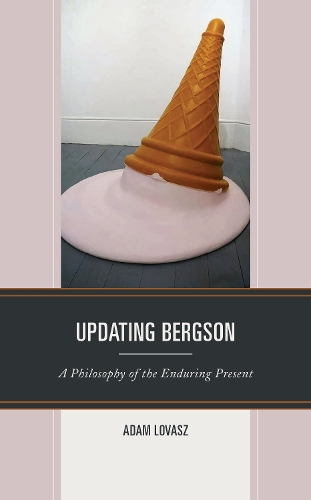
Updating Bergson: A Philosophy of the Enduring Present
(Hardback)
Publishing Details
Updating Bergson: A Philosophy of the Enduring Present
By (Author) Adam Lovasz
Bloomsbury Publishing PLC
Lexington Books
25th May 2021
United States
Classifications
Professional and Scholarly
Non Fiction
History of science
Literary studies: c 1900 to c 2000
194
Physical Properties
Hardback
332
Width 164mm, Height 228mm, Spine 31mm
671g
Description
Over the past few decades, there has been a renewal of scholarly interest in the work of Henri Bergson (18591941). At once a commentary and a stark re-evaluation of Bergsons philosophy, Updating Bergson: A Philosophy of the Enduring Present argues that time should be thought of as a hierarchy of simultaneous durations, the shifting reality of which can be revealed by the philosophical method of intuition. A duration is a perpetually dynamic flow situated in the now. Put simply, for Bergson, change is the substance of things. Nothing exists apart from alteration. Adam Lovasz analyzes Bergsons philosophy of time, encompassing the three basic types of durationmaterial, organic, and subjectiveand also touches on themes such as relativity, evolution, the problem of materialism and idealism, and the topic of free will. Lovasz connects key questions addressed by Bergson to contemporary scientific debates and paradigms. Shedding new light on the various aspects of Bergson's philosophy, this book is both a provocation and an invitation to think in terms of the enduring present, rather than committing ourselves to a dead past or an absent future.
Reviews
"Reading Bergsons philosophical texts is a challenge. Lacking clarity and uniformity in his discourse and deliberately avoiding definitions, Bergson nevertheless aims to persuade the reader to think about reality in a different way than he or she has done before. The French philosopher asks us to stop relying on concepts because they channel our thoughts and make us disregard reality per se, which is richer than the aggregation of notions. Accordingly, a Bergson reader learns that the analytical approach falsifies the object of inquiry because analysis allegedly dismantles and misrepresents its essentially dynamic nature.
The only way one can access subject matter adequately is via intuition, according to Bergson. That said, the knowledge acquired in an intuitive grasp is incommunicable, because communicating a thought requires breaking it down into verbalized segments thus jeopardizing its unity and integrity. However, if philosophers want to overcome the limitations of a human approach to reasoning and understand what unperceived reality is, they must integrate the intuitive grasp into the philosophical discoursesomehow.
Over a century passed since Bergson set this intellectual challenge, and commentators, critics, and followers have produced a substantial body of research clarifying, cataloging, attacking, and developing Bergsons theory. Scholars interest in Bergson has had its highs and lows, but if the twenty-first century philosophy readers and commentators turn to Bergsonism with a renewed enthusiasm, I would not be surprised to find that Adam Lovaszs Updating Bergson played a significant part in this.
Unlike other scholars who engage with Bergson by working through his texts chronologically, Lovasz negotiates them in reverse order. Accordingly, beginning with Bergsons later writings, he leaves Time and Free Will, the philosophers initial discussion of time and being, till the end.
This original and simple move achieves a great deal.
Bergsons theory is not consistent throughout his books because his ideas developed over time and his arguments became modified accordingly. Therefore, until now, Bergson readers shared his intellectual journey following the same path of tentative discovery, rewarding and full of exciting revelations, but at times fatiguing and frustrating due to puzzling inconsistencies.
By examining Bergsons last book, The Creative Mind, in the first chapter, Lovasz offers the summary of Bergsons philosophy saving new Bergson readers from having to make the same journey as their predecessors. With Bergsons important ideas condensed and synopsized in this way, the readers will find following Bergson easier, as they will get a much clearer vision of the entire project, prefaced by its outcome.
In his writing, Lovasz achieves the high level of control over Bergsons entire pool of texts, effortlessly navigating between ideas that cut across various themes, successfully disengaging from Bergsons vocabulary and thus avoiding the trap of the circularity of argumentation.
Successfully resisting the gravitational pull of Bergsons original conceptual framework but remaining faithful to the core idea of Bergsons project allowed Lovasz to make a serious attempt at resolving Bergsons epistemological contradiction. Whilst Bergson seems to have been unable to reconcile intuitive insight and communication (since the communication requires concepts, which are unable to convey intuitions), as Lovasz engages with the ideas of duration, image, and matter he deploys terse and punchy metaphors that immediately become more than metaphors but a methodological device effectively conveying Bergson-inspired vision of reality that lies beyond our habitual cognition.
Undoubtedly, as the readers become acquainted with Lovaszs clear and tightly argued discourse, they will be convinced that by excavat[ing] the radical potential of Bergsonism it may be eventually possible to break[] out of the cage of restricted, anthropomorphic thought and engage with nonlinear dynamics of ontological consistencythe effort that will be rewarded by acquiring the mental vision of raw brute being, using Lovaszs words. After all, this is the challenge that Bergson sets his reader and which Lovasz urges us to accept."
-- Elena Fell, author of Duration, Temporality and Self: Prospects for the Future of Bergsonism"Lovasz returns to Bergsons radical critique of intellection and pushes it even further, rekindling the spark of the philosophers many inquiries into duration, intuition, memory, lan vital, physics, freedom, and consciousness."
-- Benjamin Fraser, University of ArizonaAuthor Bio
Adam Lovasz is a researcher affiliated with Etvs Lornd University, Budapest.
